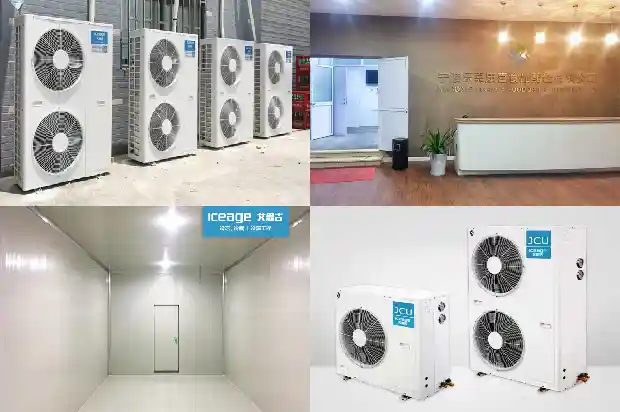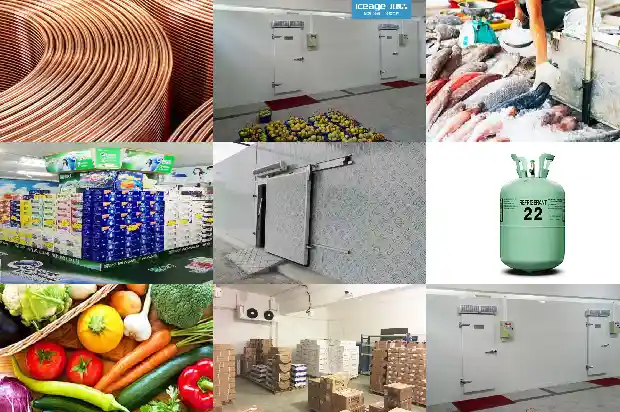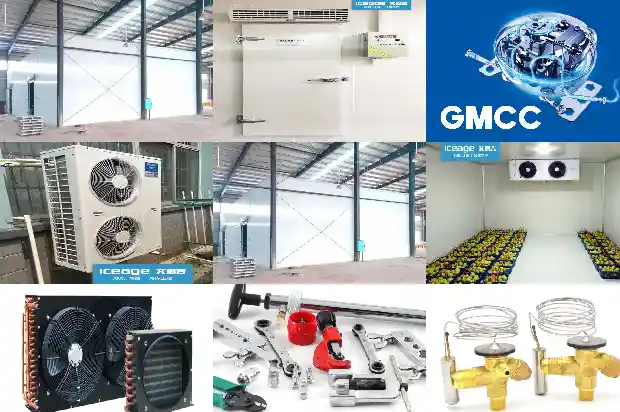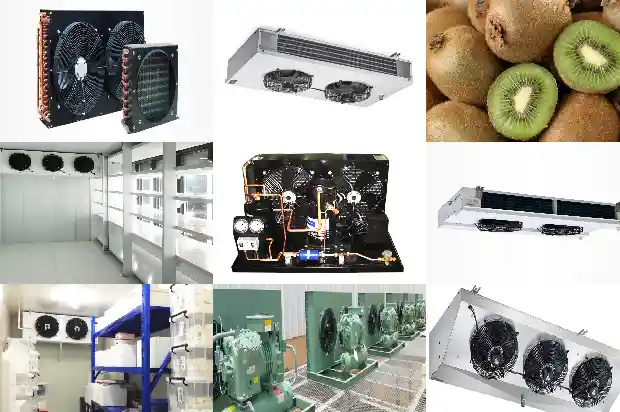Analysis of Causes for Compressor Liquid Hammer, Overheating and Pre - heating
2025-02-25
Many low - temperature chiller units use original imported scroll compressors. Therefore, many customers also call them scroll chillers. During the operation of the chiller, various problems often cause phenomena such as compressor burnout and liquid hammer.
The occurrence of liquid hammer in the compressor of a low - temperature chiller can lead to damage to the scroll plate. The fault phenomenon of liquid hammer is generally manifested as an obvious metallic impact sound inside the compressor, which is the sound of metal fragments after the scroll plate is broken colliding with each other or with the compressor housing.
The main situations that cause liquid hammer are as follows:
- A large amount of liquid refrigerant enters the compressor at the moment of startup, or the compressor is not pre - heated.
- The evaporator flow rate is insufficient (the throttling load decreases), and there is a liquid return phenomenon in the compressor.
- The defrosting of the unit during heat - pump operation is not good, and a large amount of liquid refrigerant enters the compressor without evaporation.
- It is caused by the liquid in the evaporator entering the compressor at the moment of the four - way valve reversing.
So, how should we solve the problems of liquid hammer or liquid return?
- In the pipeline design, it is necessary to prevent liquid refrigerant from entering the compressor during startup, especially in refrigeration systems with a relatively large charge. Adding a gas - liquid separator at the compressor suction port is an effective way to solve this problem, especially in heat - pump units using reverse - cycle hot - gas defrosting.
- Before startup, pre - heating the oil chamber of the chiller compressor for a sufficient period of time can effectively prevent a large amount of refrigerant from accumulating in the lubricating oil, which also has a certain effect on preventing liquid hammer.

- The water - system flow protection is indispensable. In this way, when the water flow is insufficient, it can protect the compressor to prevent the unit from having a liquid return phenomenon or even freezing and damaging the evaporator in severe cases.
- The refrigeration compressor should be pre - heated before startup. The reasons for pre - heating are explained in detail at the end of this article.

What are the reasons for the overheating of the chiller compressor? Let's analyze it from three aspects:
First, the compressor has an excessive load and runs with over - current. The possible factors are: the cooling water temperature is too high, the refrigerant charge is excessive, or there are non - condensable gases such as air in the refrigeration system, resulting in a large compressor load, manifested as over - current, accompanied by a high - pressure fault.
Second, electrical problems cause the compressor of the low - temperature chiller to run with over - current. For example, the three - phase power supply voltage is too low or unbalanced, resulting in excessive current or excessive current in one phase; the AC contactor is damaged, and the contacts are ablated, resulting in excessive contact current or excessive current due to a phase - loss.
Third, the over - heat protection module of the low - temperature chiller is damp or damaged, the intermediate relay is damaged, and the contacts are poor, manifested as an over - heat fault occurring immediately after startup, and the compressor cannot start. If there is a problem with the unit's electronic board or communication, it may also falsely report an over - heat fault.
First, the compressor has an excessive load and runs with over - current. The possible factors are: the cooling water temperature is too high, the refrigerant charge is excessive, or there are non - condensable gases such as air in the refrigeration system, resulting in a large compressor load, manifested as over - current, accompanied by a high - pressure fault.
Second, electrical problems cause the compressor of the low - temperature chiller to run with over - current. For example, the three - phase power supply voltage is too low or unbalanced, resulting in excessive current or excessive current in one phase; the AC contactor is damaged, and the contacts are ablated, resulting in excessive contact current or excessive current due to a phase - loss.
Third, the over - heat protection module of the low - temperature chiller is damp or damaged, the intermediate relay is damaged, and the contacts are poor, manifested as an over - heat fault occurring immediately after startup, and the compressor cannot start. If there is a problem with the unit's electronic board or communication, it may also falsely report an over - heat fault.
Why does the chiller need to start pre - heating the refrigeration system? Many refrigerants have a certain solubility in the compressor's refrigeration oil. When the refrigeration system stops, there is a certain pressure in the system. A considerable part of the refrigerant will dissolve in the refrigeration oil. The amount of dissolution increases with the increase of pressure and decreases with the increase of temperature. Without any measures, when the pressure in the compressor crankcase decreases during startup, a large amount of refrigerant will boil out of the oil, causing the oil to foam, which is then sucked, compressed, and discharged by the compressor, resulting in compressor liquid hammer or oil shortage.
To avoid this situation, when the unit has not been started for a long time, the unit should be powered on 8 hours before startup. After the unit is powered on, the heating works automatically, and when the chiller is running, the oil heating stops automatically. If the unit is not started regularly, it is okay as long as the unit is not powered off. The refrigeration encyclopedia reminds that there is no fixed value for this pre - heating time. For example, some chillers are required to be powered on for 24 hours before the first startup, and some other manufacturers require 12 hours. However, a longer time is safer, and 24 hours is sufficient.
In addition, large - scale refrigeration compressors have a large starting torque. In low - temperature conditions, the refrigeration oil becomes thick due to the temperature effect, which will form a resistance and cause damage to the compressor. Therefore, large - scale cold - dryers need to be pre - heated with a heating tape before startup. The temperature rise will vaporize the refrigerant and reduce the viscosity of the lubricating oil, enabling the compressor to work better.
To avoid this situation, when the unit has not been started for a long time, the unit should be powered on 8 hours before startup. After the unit is powered on, the heating works automatically, and when the chiller is running, the oil heating stops automatically. If the unit is not started regularly, it is okay as long as the unit is not powered off. The refrigeration encyclopedia reminds that there is no fixed value for this pre - heating time. For example, some chillers are required to be powered on for 24 hours before the first startup, and some other manufacturers require 12 hours. However, a longer time is safer, and 24 hours is sufficient.

In addition, large - scale refrigeration compressors have a large starting torque. In low - temperature conditions, the refrigeration oil becomes thick due to the temperature effect, which will form a resistance and cause damage to the compressor. Therefore, large - scale cold - dryers need to be pre - heated with a heating tape before startup. The temperature rise will vaporize the refrigerant and reduce the viscosity of the lubricating oil, enabling the compressor to work better.

Related Articles
- Analysis of Seven Reasons for Ice Formation in Computer Room Air Conditioners
- Analysis and Troubleshooting of Common Faults in Air - source Heat Pumps
- Analysis of 6 Components in Air - cooled Multi - split Systems
- Analysis of Advantages, Disadvantages and 34 Common Components of Multi - split Air Conditioners
- Common Causes and Analysis of High and Low Pressure Alarms
- Common Causes and Analysis of Compressor Thermal Protection
- Analysis of Common Faults in Compressor Overcurrent and Burnout
- Analysis of Causes for Safety Valve Leakage
- Analysis of Refrigeration Compressor Motor Faults
- Fault Analysis of Working Principle of Screw Chiller Unit
- Analysis and Treatment of Common Low-Pressure Faults in Chillers
- Analysis and Treatment of Common Low Pressure Faults in Chillers
- Water Cooled Unit Principle of Operation and Parameter Failure Analysis
- Causes and Solutions of Ice Blockage, Dirt Blockage and Oil Blockage
- What Are the Common Causes of High - pressure Faults in Chillers?
- What Are the Common Causes of Cold Air Blower Noise?
- Air - conditioner Low - pressure Alarm? These Nine Common Causes
- What Are the Causes of Scroll Compressor Damage?
